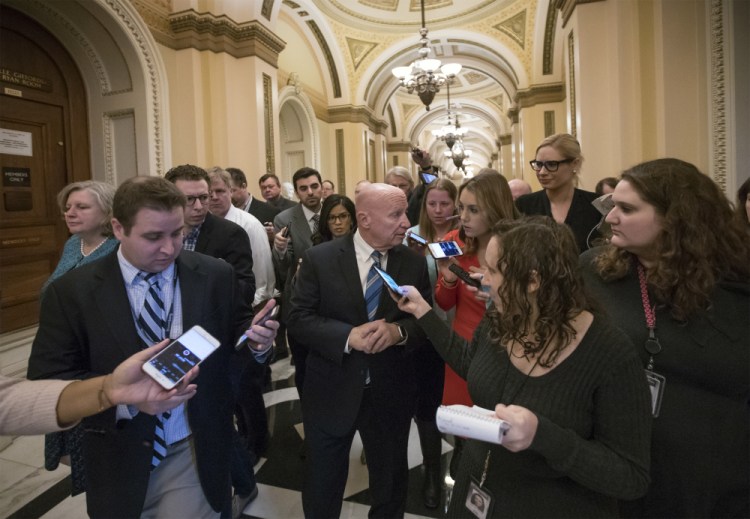Republicans were joyful Friday as they finalized their tax plan, bridging differences between the House and Senate bills and moving another step closer to getting legislation to President Trump by Christmas.
Republicans also appear, at least for now, to have locked down the votes they need to pass the measure through the House and Senate, after holdout Sens. Marco Rubio, R-Fla., and Bob Corker, R-Tenn., pledged their support.
Overall, the Tax Cut and Jobs Act is the largest one-time reduction in the corporate tax rate in American history: from 35 percent down to 21. The bill also lowers taxes for the vast majority of Americans and small-business owners – at least until the cuts expire after eight years.
Last-minute changes to the Republicans’ big plan gave a larger tax break to the wealthy and preserved certain tax savings for the middle class, including the student loan interest deduction, the deduction for excessive medical expenses, and the tax break for graduate students. A change Friday morning to win over Rubio gives working-class families who have kids a few hundred dollars more back from the government.
Here’s a rundown of what’s in the final bill. The full text is expected to be released to the public Friday and voted on early next week.
What is changing:
A new tax cut for the rich: The final plan lowers the top tax rate for top earners. Under current law, the highest rate is 39.6 percent for married couples earning over $470,700. The GOP bill would drop that to 37 percent and raise the threshold at which that top rate only kicks in. This amounts to a significant tax break for the very wealthy, a departure from repeated claims by President Trump and his top officials that the bill would not cut taxes on the rich. The new tax break for millionaires goes beyond what was in the original House and Senate bill, as Republicans sought to ensure wealthy earners in states such New York, Connecticut and California don’t end up paying substantially higher taxes as a result of the bill.
A massive tax cut for corporations to 21 percent: Starting on January 1, 2018, big businesses would see their tax rate fall from 35 percent to just 21 percent, the largest one-time rate cut in U.S. history for America’s largest companies. The House and Senate bills originally had the big-business tax rate falling to 20 percent, but Republicans were not able to make the math work to keep the rate that low and start it right away in the new year, so they compromised by moving the rate to 21. It’s still amounts to roughly a $1 trillion tax cut for businesses over the next decade. Republicans argue this will make the economy surge in the coming years, but most independent economists and Wall Street banks predict only a “modest” and short-lived boost to growth.
You can deduct just $10,000 in state, local and property taxes: One of the most controversial parts of the Republican tax plan is the push to greatly scale back how much state and local taxes Americans can deduct on their federal income taxes. Under current law, the state and local deduction (SALT) is unlimited. In the fina lRepublican plan, people can deduct up to $10,000. The House initially restricted the $10,000 deduction to just property taxes, but the final bill allows any state and local taxes to be deducted, whether for property, income or sales taxes. The move is widely viewed as a hit to blue-states like New York, Connecticut and California, and there are concerns it could cause property values to fall in high-tax cities and leave less money for public schools and road repairs.
Working-class families get a bigger Child Tax Credit: Thanks to a late push by Marco Rubio and Sen. Mike Lee, R-Utah, the Child Tax Credit became more generous low-income families and the working class. The current Child Tax Credit is $1,000 per kid. Both the House and Senate bills expanded the Child Tax Credit, with the Senate going up to a maximum of $2,000 per child. The final bill keeps the $2,000 per child credit (families making up to about $400,000 get take the credit), but it also makes more of the tax credit refundable, meaning families that work but don’t earn enough to actually owe any federal income taxes will get a large check back from the government. Benefits for those families were initially limited to about $1,100, but through changes Rubio and Lee pushed for, it’s now up to $1,400.
You can inherit up to $11 million tax-free: In the end, the estate tax (often called the “death tax” by opponents) remains, but far fewer families will have to pay it. Under current law, Americans can inherit up to $5.5 million tax-free (that threshold is $11 million for married couples). The House wanted to do away with the estate tax entirely, but some senators felt that was too much of a giveaway to the mega rich. The final compromise was to double the threshold, so now the first $11 million that people inherit in property, stocks and other assets won’t be taxed (and yes, that means $22 million for married couples).
Send questions/comments to the editors.



Success. Please wait for the page to reload. If the page does not reload within 5 seconds, please refresh the page.
Enter your email and password to access comments.
Hi, to comment on stories you must . This profile is in addition to your subscription and website login.
Already have a commenting profile? .
Invalid username/password.
Please check your email to confirm and complete your registration.
Only subscribers are eligible to post comments. Please subscribe or login first for digital access. Here’s why.
Use the form below to reset your password. When you've submitted your account email, we will send an email with a reset code.